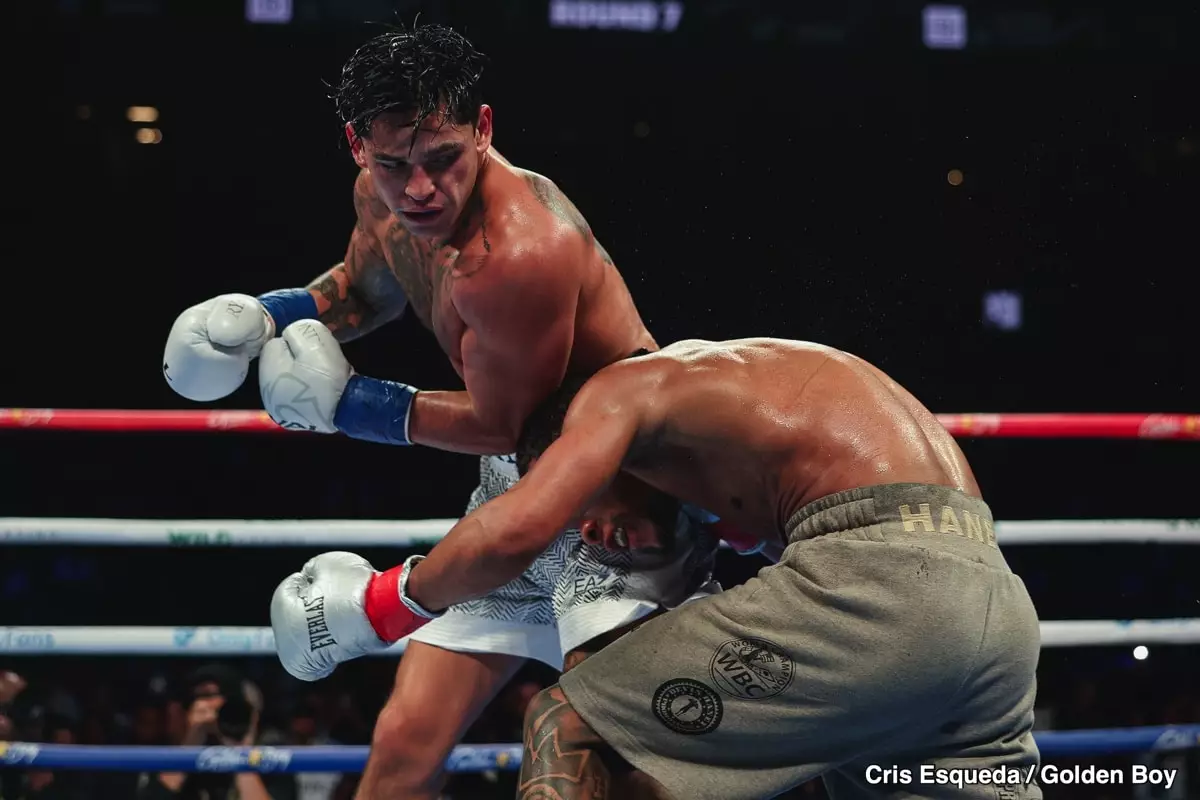Devin Haney, the undefeated lightweight champion, has recently found himself embroiled in a controversy that could impact his career for years to come. Following his loss to Ryan Garcia on April 20th and the subsequent revelations concerning a positive performance-enhancing drug (PED) test for Ostarine, Haney opted to file a lawsuit against Garcia, citing battery, fraud, and unjust enrichment. This decision has stirred significant backlash from the boxing community, particularly on social media platforms like X (formerly Twitter), where fans have publicly critiqued and scrutinized his actions.
Chris Algieri, a former world champion and current boxing analyst, has been vocal in his criticism of Haney’s decision to pursue legal action at this juncture. Algieri argues that until Haney steps back into the ring and secures meaningful victories, he will continue to be a target for ridicule. The emergence of social media as a powerful platform has amplified fan sentiment, and in this case, Haney’s image has taken a considerable hit. Many fans perceive his lawsuit as a sign of weakness, indicating an inability to accept defeat gracefully.
Haney’s choice to announce the lawsuit seems to have backfired, creating an impression of desperation and diminishing his status as a competitive athlete. Instead of focusing on improving his skills and reclaiming his standing in the boxing hierarchy, Haney has attracted unwelcome media attention and damaged his brand. Algieri suggests that a better strategy would have been for Haney to capitalize on a couple of wins against elite opponents before taking any legal action. However, given the current circumstances, it’s fair to question which fighters in the welterweight division he could realistically defeat.
Competing in a new weight class presents its own set of challenges. As Haney transitions to welterweight, the level of competition drastically escalates. According to boxing experts, he might not fare well against the division’s elite fighters, such as Jaron Ennis or Brian Norman Jr., both of whom are considered formidable opponents. As highlighted in the aftermath of his matchup with Garcia, Haney’s physical attributes and boxing acumen may not be sufficient to secure victories against seasoned fighters who possess stronger knockout power and ring intelligence.
Ryan Garcia’s statements on his social media platforms have further complicated Haney’s situation. Garcia is adamant that, irrespective of the circumstances, their rivalry is one-sided, emphasizing his strength and skill in their prior encounter. By dismissing Haney’s capabilities outright, Garcia not only strengthens his own public persona but also exacerbates the issues surrounding Haney’s newfound vulnerability, putting additional pressure on him to recover his reputation through performance.
Following the legal disputes and losses, Haney’s career trajectory appears uncertain. Algieri points out that the fallout from the Garcia fight has severely undermined Haney’s earning potential. This was evident in the low purse bid for his next scheduled fight against Sandor Martin, where promoters showed little interest, resulting in a significant financial downgrade from what Haney was accustomed to. The perception of weakness and its impact on negotiating power within the boxing landscape is critical; fighters who exude confidence tend to attract more lucrative opportunities and sponsorships.
Moreover, Algieri critiques Haney’s decision to delay his return to the ring. Although not suspended, Haney missed a crucial opportunity against Martin that could have revitalized his career and allowed him to demonstrate that he is more than just the fighter who lost to Garcia. A decisive win would have helped mitigate the negative perceptions surrounding his recent legal endeavors.
The ongoing discussions around PEDs and weight rehydration practices highlight a significant gap in the current regulatory landscape of boxing. As Algieri mentions, the absence of a unified commission to oversee these issues perpetuates inconsistencies that can jeopardize the sport’s integrity. Establishing comprehensive standards that address not only performance-enhancing substances but also athlete safety is paramount in ensuring the sport evolves positively for future generations.
Devin Haney’s current predicament sheds light on the intertwining dynamics of personal conduct, public image, and competitive stature in professional boxing. With critical assessments from analysts and fans alike, it becomes evident that regaining respect in the boxing community hinges on his performance in the ring, rather than in the courtroom. As he navigates this challenging period, the upcoming months will be crucial in determining whether Haney can reestablish his standing and transform the narrative surrounding his career.

